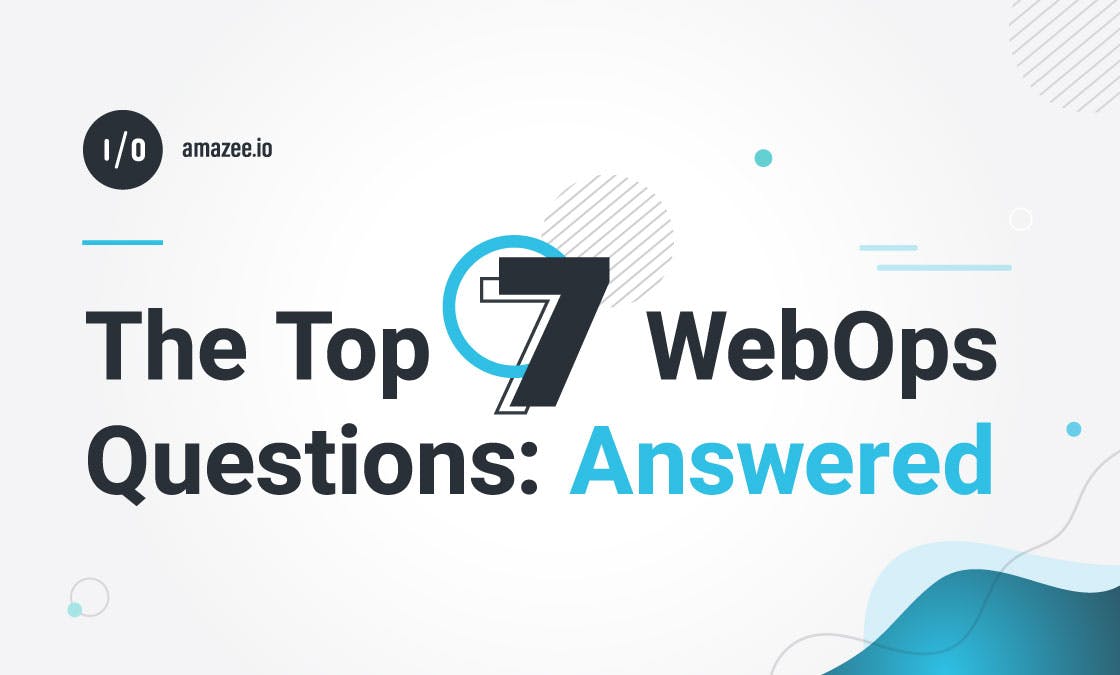Sophia Harris
|
Apr 19, 2022
|9 min read
Search Topic

WebOps: What even is it? Today we’re collecting our most common questions about WebOps and answering them in a Q&A with Bryan Gruneberg. If you haven’t yet read it, check out our original WebOps explainer blog, and our follow-up article about why businesses in 2022 are moving towards WebOps faster than ever.
Let’s dive right in:
Bryan: DevOps is not WebOps, but they certainly do have similarities. WebOps is LIKE DevOps - but for web teams and processes only. WebOps is for teams dealing with hosting, managing, monitoring, and updating their web properties, whereas DevOps is used more broadly by developers and software teams creating applications.
Originally, DevOps was created to be a very strong force for bringing all the teams needed to run an application together. WebOps includes everyone who needs to sit around the delivery of web presence: It gets the right information in the right people’s hands.
Although the principles are applied in different areas, DevOps and WebOps have this in common: They’re a set of practices to ensure smoother processes, better teamwork, more automation, and if done right, they can create faster timelines, easier deployments, and easier maintenance and updating.
WebOps processes promote communication and collaboration for better web deployments, operations, and management of websites and web apps. WebOps should ideally include CI/CD tools with an emphasis on automation, monitoring, cloud computing, containers, and better security.
Both DevOps and WebOps practices include Agile methodologies and focus on improving life cycles.
Another thing is for certain: DevOps and WebOps practices make life a whole lot easier for developers and engineering teams.
Bryan: Not sure I would say “better,” because hosting is great for what it is, but the problem is that most people want more, especially businesses with multiple sites and online presences. The main problem with legacy hosting is that it’s very limited, and it doesn’t really help developers do everything they need to do.
WebOps is different from legacy hosting in the sense that it is a LOT more. Hosting is one part of a WebOps strategy, but it’s not the whole thing. WebOps originally emerged as a way to help businesses dramatically improve the way they build, host, manage, maintain, secure, and extend their websites and web apps. It’s much more of an end-to-end practice or solution for web properties, whereas legacy hosting is just one part.
Using a dedicated WebOps platform would effectively remove the need for your developers to run, host, monitor, maintain, update, and oversee your websites and apps. This is a huge weight off their shoulders, especially when it comes to deployments and troubleshooting.
Bryan: A key struggle that many companies have with legacy hosting is that they may have multiple vendors and hosting providers for their different sites and offerings. This can end up being really confusing and hard to keep track of, not to mention costly - with all those contracts. As each vendor and team takes their own approach, infrastructure implementations vary wildly, and this leaves developers in the dark in terms of scaling, monitoring, and maintaining. It can be done, but it sinks so much time and energy into something that should be really simple.
Another key reason that developers and IT operations struggle with their site is that there’s simply too much to oversee. If a company has multiple sites, landing pages, and apps to manage, oversee, and update, this can get out of control quickly, especially if multiple vendors are being used for hosting. Even if they’re not, it’s truly a challenge to make sure 25 websites are secure, updated, and deploying on time - especially if you have a small team.
WebOps actually solves this problem by increasing visibility for everyone, particularly with a WebOps solution that comes with built-in reporting and dashboards. For example, Lagoon, the powerful engine within amazee.io’s Dedicated Cloud, comes with an easy-to-use reporting dashboard and Insights board that reports any security updates, vulnerabilities, or risks. Whether you have 2 sites or 2000, it’s all going to be reported on that same page in Lagoon.

WebOps puts more tools in more people's hands, so you don't need to ask busy people to do things that you are empowered to do yourself. A strength of WebOps, when compared to legacy hosting, is that it helps specific team members meet their individual needs more easily (and faster).
Bryan: It doesn’t have to be, necessarily, but we certainly recommend it and we use it in our WebOps platform.
Kubernetes, or its short form K8s, is an open source container orchestration platform.
Kubernetes ensures that your applications in cloud environments run consistently by automating operations such as deploying, scaling, and managing containers or clusters. Applications can range from big data processing to content management systems. Kubernetes helps you to efficiently manage your containers by getting rid of much of the manual work required to deploy and scale applications via containers.
There are two key reasons that our WebOps platform leverages Kubernetes.
So you can see why Kubernetes is a valuable part of WebOps, which is all about speed, efficiency, automation, and improving processes. WebOps can certainly be achieved without Kubernetes, but it would be a lot harder, and you would end up building a bespoke container orchestration system anyway - so we go with what we know works!.
There is one drawback of Kubernetes though: It’s deeply technical, has a lot of domain specificity, and is complex. It takes a time commitment to learn Kubernetes and become an expert in the system. Many developers and teams don’t feel comfortable trying to do it on their own, and they’re intimidated by it, so they just don’t use it the way they should or don't use it at all.
Of course, there is also the other side of that coin - some engineers underestimate the complexity and scale of running a full-blown production Kubernetes cluster. We call it the day-1-day-2 problem. Day 1 is fun and exciting, breaking new ground, setting up greenfields… it's exciting. Then Day 2 arrives, and everything you built on Day 1 needs to be maintained, secured, supported, and scaled.
That’s actually a key part of Dedicated Cloud and Lagoon - we know learning Kubernetes would take too long, so the Kubernetes expertise is actually built inside of Lagoon. This means your team can start using it now, harnessing all the benefits now, and learning as you go - so you wouldn’t have to wait.
You could learn Kubernetes and run it on your own - but you’re going to sadly be waiting a long time to use it correctly, and there will be lots of learning curves involved.
The biggest takeaway from this is that it IS possible to leverage Kubernetes even without actually learning it, without having experts on your team, as long as you have the right software and partners along the way.
Bryan: I would say these are the biggest challenges for those developers:
Bryan: No, it doesn’t have to be. Our WebOps platform does happen to be open source, mainly because open source is flexible, community-based, and relies on the spirit of collaboration and improvement.
Lagoon was created to be an open source community project because we really want developers to understand the platform, see what’s under the hood, and participate in its continual improvement.
Our WebOps platform actually leverages several open source components and hosts many open source frameworks and apps and apps like Drupal, WordPress, Laravel, Symfony, Gatsby - and way way more. We just felt that it made sense to be open source ourselves, in the spirit of improvement, innovation, and transparency.
Bryan: At a whole new level than it is now. WebOps is being adopted more frequently than ever in 2022, and as times change and things become even more digital (is that possible? yes) we will see a significant uptick in WebOps adoption.
We see that companies who adopt a WebOps approach are generally more competitive because their services are more agile, scalable, and adaptable. From a business operations standpoint, WebOps helps remove some of those limitations and bottlenecks that keep you from experimenting, being creative, and ramping up your website. Factors like continuous deployments, proactive monitoring, and better reporting can help your site performance increase. You can make faster critical changes to your site, improve SEO ranking, and deploy more easily than ever before.
The requirements for delivering web-based solutions are just more demanding than they were even 2-3 years ago. From a technical perspective, WebOps helps you stay competitive with improved metrics, automatic deployments, maintaining uptime, scaling, and supporting troubleshooting.
So there are the technical and organizational aspects. From a technical standpoint, the benefits are clear. The organizational aspects relate closely to the DevOps point from earlier - The improved tooling makes such a difference for project managers, IT leaders, security teams, developers, and CTOs.
All of these components are going to be necessary for the future of your web properties- especially in this post-pandemic world. So many things just moved online and have stayed there: the times really are changing. And your hosting solution also may have to change.
Have a WebOps question? Just ping us on LinkedIn. We’ll answer it in our next Q&A.

